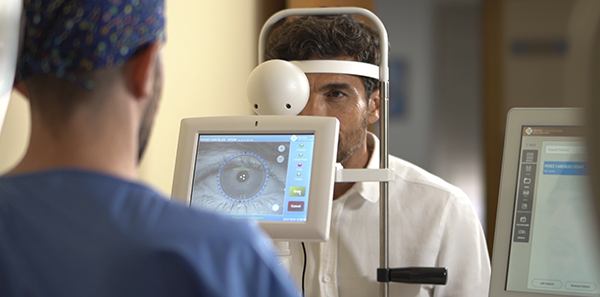
The macula is the central section of the retina and the most important part for vision, as it is the area of the retina with the highest number of photoreceptors.
Diseases affecting the macula result in severe loss of central vision, inability to read and a distorted view of objects.
Of all the different diseases that can affect the macula, ARMD or Age-Related Macular Degeneration is undoubtedly the most frequent, producing visual impairment in a large part of the population aged over 65.
Exudative or wet ARMD is the most aggressive and fastest developing form of the disease, causing bleeding and build-up of fluid inside the macula, as neovessel complexes are generated in response to the diseased macula producing a substance known as vascular endothelial growth factor (VEGF).
Anti-angiogenic drugs, a revolution in treating diseases of the macula.
Some years ago, two drugs, Lucentis® and Eylea® were approved for intraocular use and found to be highly effective in neutralising the effects of VEGF on the retina. The visual prognosis for patients affected by wet ARMD has improved considerably since we have been using this medication, particularly if the disease is diagnosed early
More recently, these drugs have been authorised for use in treating other severe macula diseases in which the vascular endothelial growth factor (VEGF) plays a leading role: diabetic retinopathy and thrombosis of veins on the retina; they have now become front-line treatments that have noticeably improved the results obtained with laser treatment.
The success of anti-angiogenic drugs in treating the diseases for which they were approved has led to their use for treating other diseases of the macula, such as central serous chorioretinopathy (CSCR), eye inflammation, telangiectasias, etc.
The disadvantage of anti-angiogenic drugs is that they need to be administered via intraocular injection and they must be used repeatedly and for long periods of time.
Many diseases of the macula that only a few years ago resulted in major loss of vision have undoubtedly improved expectations of improvement due to the use of these new drugs, although it is essential to highlight the extreme importance of early diagnosis and administering treatment by strictly following the appropriate protocols for every disease.
Dr. Agustín Martín Justicia – Bachelor of Medicine and Surgery Ophthalmology Specialist Dr. Cintrano Ophthalmology Clinic (Madrid)
The information published in this media neither substitutes nor complements in any way the direct supervision of a doctor, his diagnosis or the treatment that he may prescribe. It should also not be used for self-diagnosis.
The exclusive responsibility for the use of this service lies with the reader.
ASSSA advises you to always consult your doctor about any issue concerning your health.












